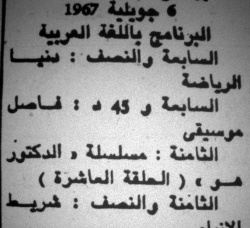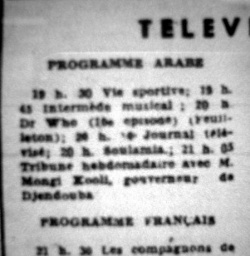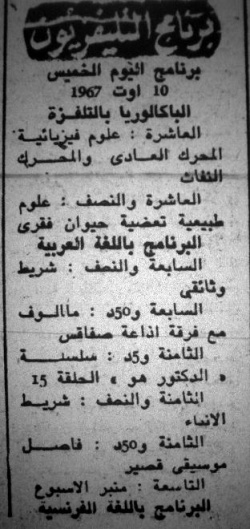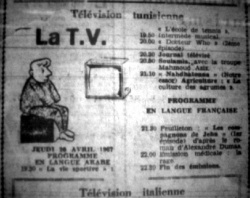Difference between revisions of "Tunisia"
Jon Preddle (talk | contribs) |
Jon Preddle (talk | contribs) |
||
| Line 158: | Line 158: | ||
The next [[Arabic]] country to buy '''Doctor Who''' was [[Morocco]], with sales dated May 1968. Given their very close proximity to each other, it is more than likely that Tunisia sent its prints of the Hartnell stories that it aired to [[Morocco]], with the "missing" ones acquired by [[Morocco]] from a different source. | The next [[Arabic]] country to buy '''Doctor Who''' was [[Morocco]], with sales dated May 1968. Given their very close proximity to each other, it is more than likely that Tunisia sent its prints of the Hartnell stories that it aired to [[Morocco]], with the "missing" ones acquired by [[Morocco]] from a different source. | ||
| + | |||
| + | But of note, [[Iran]] screened the very same seven stories in a block from January to October 1969. It wasn't until February 1970 that NIRTV aired more. It's therefore possible that Tunisia sent the stories to Iran. (Although the principal language of Iran is Farsi rather than [[Arabic]], the two languages are not too dissimilar, so NIRTV could have aired the serials with the Arabic soundtrack substituted by a Farsi language dub with the Music / Effects track supplied by the BBC.) | ||
Revision as of 22:03, 24 April 2015
TUNISIA is in North Africa, on the Mediterranean sea. It borders Algeria and Libya.
Profile
| Country Number (24) | 1967 | FIRST WAVE |
| Region | Africa | |
| Television commenced | 31 May 1966 | |
| Colour System | 1976 | PAL |
| Population | 1966 | 4.5 million |
| TV Sets | 1966 | 5,000 |
| Language/s | Arabic, French | Dubbed and Subtitled |
Television Stations / Channels
Television was available in Tunisia from the late 1950s, when one of the Italian broadcasters set up a relay station in Tunis to receive signals transmitted from Italy.
The Tunisian government launched its own television service, Radiodiffusion-Television Tunisienne (RTT), on 31 May 1966.
Colour transmissions began in 1976 using the PAL broadcast system.
Language/s
Programming was in Arabic, French and Italian. In the 1960s, more than 50% of programming was locally-produced fare, with the remainder supplied from Egypt and Lebanon, who also provided dubbed foreign programmes.
DOCTOR WHO IN TUNISIA
الدكتور هو
Tunisia was the 24th country to screen Doctor Who. It was also the first of the Arabic-speaking nations to purchase the series (see Selling Doctor Who).
BBC Records
Tunisia is not included in the list of 27 countries in The Making of Doctor Who (1972 Piccolo edition).
The Seventies records a sale of "(4)" stories by 28 February 1977. The Handbook identifies these as being: C, F, G and J.
In DWM, Tunisia is identified in six story Archives: the above four, plus A and E.
It is likely that B was also aired, making seven in total.
Stories bought and broadcast
WILLIAM HARTNELL
Seven stories, 32 episodes but all screened?:
| A | An Unearthly Child | 1 or 4? |
| B | The Daleks | 7 |
| C | Inside the Spaceship | 2 |
| E | The Keys of Marinus | 6 |
| F | The Aztecs | 4 |
| G | The Sensorites | 6 |
| J | Planet of Giants | 3 |
Tunisia therefore bought the standard GROUP A, B and C of the William Hartnell stories that had been dubbed into Arabic, but not The Dalek Invasion of Earth and The Rescue.
One reason why those two were not purchased at the time may have been due to the on-going issues between the BBC and Dalek creator Terry Nation. During late 1966 and all of 1967 Nation was having discussions with American TV networks with regard to the setting up of a spin-off series featuring the Daleks. The BBC has agreed that it would not continue to sell any Daleks serials, although any sales that had already been negotiated before the moratorium was placed were not affected. Tunisia must have completed its purchase of The Daleks before the moratorium began, but missed out on purchasing The Dalek Invasion of Earth; presumably The Rescue was not purchased at the same time due to its narrative link to that Dalek serial (i.e. Susan's departure).
(See the section Who Dubbed Who? on the Spanish page for more discussion about issues concerning the foreign dubbings of those two stories.)
The dates of the series' sale to Tunisia are unusual: the first three serials were purchased by 25 October 1967, the last three by 20 November, and The Keys of Marinus by 12 December. Whether the late "sale" of that six-parter has any bearing on there being at least six episodes unaccounted for is unknown. As noted below, the Arabic edition of The Aztecs was created in November 1967, which supports when the serial was "sold".
The programme was supplied as 16mm black and white film prints with Arabic soundtracks.
Origin of the Prints?
Tunisia was the first country to receive the Arabic prints that had been dubbed for the BBC in Lebanon.
Transmission
الدكتور هو
Although 32 episodes were bought, we have only determined airdates for 23 episodes (see TV listings below).
The series started on Thursday, 13 April 1967, and aired weekly. The regular timeslot was 8.00pm or 8.05pm, with the last two at 8.15pm and 7.30pm.
The third episode of the series aired on 27 April; the next numbered episode was the 8th, on 22 June, which was actually eight weeks later. The papers for 1 May, 1, 8 and 15 June were missing, so three episodes must have been pre-empted during this period.
The 23rd and "dernier" (last/final) episode aired on 5 October 1967 at the earlier time of 7.30pm.
As noted above, only 23 of a potential 32 episodes aired. It is known for certain that all four episodes of An Unearthly Child were dubbed into Arabic, however several of the Arabic countries did not air episodes 2, 3 and 4 of the first serial. Whether this also happened in Tunisia is unknown. (The fact that Tunisia was the first Arabic nation to air the series might indicate that they did screen all four episodes, and it was only the subsequent countries did not air the other three.)
But if only part one of An Unearthly Child aired, then one of the two six-parters, The Keys of Marinus and The Sensorites, or Inside the Spaceship and The Aztecs didn't screen. As noted above, The Keys of Marinus is recorded as having been "sold" after the other six stories, which might have a bearing on the fact that at least six episodes are unaccounted for.
With 23 episodes airing in one block, the permutations of that number of episodes include:
Scenario #1
- 4 - An Unearthly Child
- 7 - The Daleks
- 2 - Inside the Spaceship
- 6 - The Keys of Marinus or The Sensorites
- 4 - The Aztecs (*)
Scenario #2
- 4 - An Unearthly Child
- 6 - The Keys of Marinus
- 4 - The Aztecs
- 6 - The Sensorites
- 3 - Planet of Giants
Scenario #3
- 1 - An Unearthly Child
- 7 - The Daleks
- 2 - Inside the Spaceship
- 6 - The Keys of Marinus or The Sensorites
- 4 - The Aztecs
- 3 - Planet of Giants
Scenario #4
- 1 - An Unearthly Child
- 7 - The Daleks
- 6 - The Keys of Marinus
- 6 - The Sensorites
- 3 - Planet of Giants
Of note, the existing Arabic print of The Aztecs episode 4 that had been used in Morocco (included on the DVD release) has the date November 1967 printed on it. If this is the date that the negative was created from which all prints were struck, that is months after the screenings in Tunisia had concluded – which strongly suggests that it was The Aztecs that did not screen in Tunisia, which means Scenario #4 is the more likely.
(*) Noted on the Arabic page is that the closing Arabic narration to this story does not describe the events of The Sensorites. Could it be that The Aztecs was the final story to air?
There is no clear record that Tunisia screened Doctor Who again, even after the switch to PAL colour in 1976.
Fate of the Prints?
The next Arabic country to buy Doctor Who was Morocco, with sales dated May 1968. Given their very close proximity to each other, it is more than likely that Tunisia sent its prints of the Hartnell stories that it aired to Morocco, with the "missing" ones acquired by Morocco from a different source.
But of note, Iran screened the very same seven stories in a block from January to October 1969. It wasn't until February 1970 that NIRTV aired more. It's therefore possible that Tunisia sent the stories to Iran. (Although the principal language of Iran is Farsi rather than Arabic, the two languages are not too dissimilar, so NIRTV could have aired the serials with the Arabic soundtrack substituted by a Farsi language dub with the Music / Effects track supplied by the BBC.)
TV listings
| ← AIRDATES ...... (CLICK ICON TO GO TO TABLE SHOWING EPISODE BREAKDOWN AND AIRDATES - N/S = story title is Not Stated) |
TV listings in French have been obtained from L'Action and La Presse de Tunisie.
The listings identify the series as "Docteur Who", "Dr Who" or "Doctor Who" under the "PROGRAMME EN LANGUE ARABE" section, meaning it was broadcast in Arabic. (The papers also list programmes in French and Italian.)
There was no paper for the first episode on 13 April, but the following week's edition had a billing for "2eme episode" (second episode).
The papers did not identify episodes by title, instead they just numbered them in French: "2eme episode", "3e episode", "dernier episode", etc. Some of the billings also says "(Feuilleton)", which means "serial".
There was no listing for the series on 10 August 1967, however the episodes before and after this date were numbered 14e and 16e, so the 15th must have aired on 10 August.
Only 23 of the 32 potential episodes have been accounted for, which means that 6 episodes didn't air – Inside the Spaceship and The Aztecs, or one of the 6-parters (the last to be "sold" The Keys of Marinus?), or played at a much later date - we checked TV listings from October 1967 to the end of 1968, but there were no further billings for the series in that fifteen month period.
We also accessed the newspaper Al-Amal, which had TV listings in Arabic. Some of the billings for الدكتور هو had a numeral next to them – such as 15, 17, etc – which matched the French numbering on the same date.







